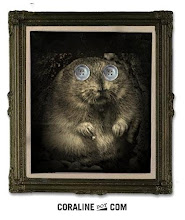Leslie Marmon Silko does something wonderful in her novel Ceremony. It is something that precious few authors are willing to do. She explores the ideas of promiscuity and prostitution in more than one of her characters without condemnation. Certainly Silko discusses the views of other people, and the internal struggle with shame around the subject, but in the end, it is the women who are seen as promiscuous that create life which ultimately changes the outcome of the novel.
Tayo's mother is never physically present in the book, but she is discussed multiple times. We know that she ran off many times to be with white men, and we know the ultimately, she gave birth to a son with an absent father who happened to be white. He has memories of being left to sleep alone in the cold and dark while his mother is with different men. She would toss money at him to go get food, or would ask one of the other women nearby to look after him, but she was busy living her life and earning her money.
His mother felt ashamed, not of herself, but of her people and of the men she slept with. "After she had been with them, she could feel the truth in their fists and in their greedy feeble love-making" (63) and she knew that these men had disdain for her people. She hated herself for still having some attachment to her family and because she knew she was causing them pain. "He was four years old the night his mother left him there. He didn't remember much: only that she had come after dark and wrapped him in a man's coat" (60).
From her affairs with these men, Tayo was born. Despite the disgust his family feels about his mother's way of life, it is Tayo who came from the allegedly disgraceful actions. Tayo goes on to embrace the history of his people more than even his family. He goes on to get back his uncle's cattle, to restore some of the lost water, and to learn how to carry on the traditions the Indians value. If his mother had simply led the life they wanted for her, settling down with another Indian man and having children, there is no way to know if her children would have been born with this same desire to change the world for the better.
The second case we can look at is that of the Night Swan. "...no one else would live up there because the juke box played loud and drunks yelled and stomped up and down the long porch downstairs. Of course only that kind of woman, used to that kind of life, would tolerate such things" (81). The Night Swan had been a cantina dancer, and everyone believed her to simply be a whore. It is quite possible that she does, in fact, prostitute herself, and even if this is not the case, it is quickly evident that she is more sexually free than the reservation women.
The people in town judge her harshly. Referring to her as "that kind of woman" and jealously snickering that "she's so old and wrinkled... all worn out. Only some Indian would want her anyway" but yet, they were constantly watching to see if it may be their husband or son who was seen leaving the apartment (81). Josiah's family condemns him for having a long standing affair with her and Auntie worries greatly about what everyone else on the reservation will think if they find out.
Despite these reactions, even the Earth favors the Night Swan. "The big tree was dying. The thick limbs at its center were brittle and white. One of the remaining live limbs brushed against the porch railing at the top of the stairs" (95). Even in a dying town, there is still life where the Night Swan resides. She talks too about the life that she has produced: "I'm a grandmother now. My daughter in Los Angeles has two beautiful little daughters. And when I dance now, I dance for them" (80). She has not only produced life, but living things are attracted to her.
It is also because of the Night Swan that Josiah gets his cattle. These cattle represent Tayo's quest for renewed life and peace. His encounter with the Night Swan is one of the things that helps him come back from the edge of death. In many ways, she and her cattle are the thing that saves not only Tayo, but the entire reservation.
So, while in the eyes of many other characters in the book, promiscuity and prostitution is frowned upon and should bring shame to the women practicing it, these women are the very ones who brought about the most positive growth in the novel. Silko's portrayal of these women and their accomplishments shows power in sexual freedom and choice and proves one of the main points of the book - one that Betonie himself states explicitly: "Nothing is that simple" (118).
Monday, April 6, 2009
Subscribe to:
Post Comments (Atom)

No comments:
Post a Comment